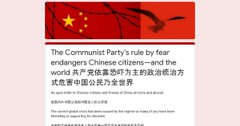 As China tames the coronavirus epidemic now ravaging other countries, its success is giving rise to an increasingly strident blend of patriotism, nationalism and xenophobia, at a pitch many say has not been seen in decades, the New York Times reports:
As China tames the coronavirus epidemic now ravaging other countries, its success is giving rise to an increasingly strident blend of patriotism, nationalism and xenophobia, at a pitch many say has not been seen in decades, the New York Times reports:
Some of the uglier manifestations of nationalism have been fueled by government propaganda, which has touted China’s response to the virus as evidence of the ruling Communist Party’s superiority. And recriminations from abroad, including calls to make China pay for the pandemic that began there, have triggered defensiveness on the part of many Chinese……They recently targeted a novelist, Fang Fang, who for two months published a daily journal of life under lockdown in Wuhan, where the outbreak began. She wrote of the bravery of ordinary people around her, while also vowing to hold local government officials to account.
Despots use fear and coercion to keep foreign ideas at bay. Smart regimes know that nationalism is a more subtle tool. Bring a society to the right pitch of rage against foreign rivals, and people will scorn outside influences of their own accord. Something like that is happening in China, four months into the outbreak of covid-19, the Economist reports:
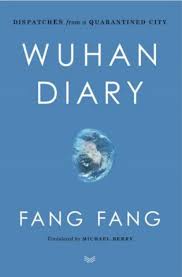 When news broke that Fang Fang’s “Quarantine Diaries” would be translated and published in America and Germany this summer. Back home, the shift in opinion was brutal. The social-media hashtag “Fang Fang’s Diaries” has received 550m views and 194,000 comments. Recent posts are overwhelmingly hostile. Netizens have been challenging her moral authority, lobbing the revealing insult “Ni bu pei!”, or “You are not qualified!” Though Fang Fang has pledged to give away her book royalties, she is charged with seeking fame at the expense of the dead—eating “buns made with human blood.”
When news broke that Fang Fang’s “Quarantine Diaries” would be translated and published in America and Germany this summer. Back home, the shift in opinion was brutal. The social-media hashtag “Fang Fang’s Diaries” has received 550m views and 194,000 comments. Recent posts are overwhelmingly hostile. Netizens have been challenging her moral authority, lobbing the revealing insult “Ni bu pei!”, or “You are not qualified!” Though Fang Fang has pledged to give away her book royalties, she is charged with seeking fame at the expense of the dead—eating “buns made with human blood.”
The global pandemic forces us all to confront an inconvenient truth: by politicizing all aspects of life including people’s health, continued autocratic one-party rule in the People’s Republic of China has endangered the entire world, according to an open letter to Chinese citizens and friends of China at home and abroad.
Rather than trusting the CCP’s intentions and accepting establishment academics’ uncritical approval of the party-state’s policies, we should pay greater attention to the voices of what can be termed ‘unofficial’ China, says the letter, signed by parliamentarians, academics, advocates and policy leaders. These independent-minded academics, doctors, entrepreneurs, citizen journalists, public interest lawyers and young students no longer accept the CCP’s rule by fear. Neither should you, they write in the letter, The Communist Party’s rule by fear endangers Chinese citizens—and the world.
As an international group of public figures, security policy analysts and China watchers we stand in solidarity with courageous and conscientious Chinese citizens including Xu Zhangrun, Ai Fen, Li Wenliang, Ren Zhiqiang, Chen Qiushi, Fang Bin, Li Zehua, Xu Zhiyong, and Zhang Wenbin, just to name a few of the real heroes and martyrs who risk their life and liberty for a free and open China, they add.
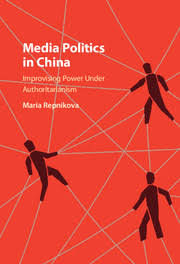 China’s propaganda has matured — but so have its targets, argues Maria Repnikova (@MariaRepnikova), an assistant professor of global communication at Georgia State University and the author of “Media Politics in China: Improvising Power Under Authoritarianism.”
China’s propaganda has matured — but so have its targets, argues Maria Repnikova (@MariaRepnikova), an assistant professor of global communication at Georgia State University and the author of “Media Politics in China: Improvising Power Under Authoritarianism.”
Instead of delivering diktat and defensiveness, the government now engages in selective dialogue with its audiences and their criticisms, featuring those views in its own storytelling, or its retelling of them. So far, this seems to have played to the Communist Party’s advantage, partly by forcing it to keep adapting its messaging. But the public, in China and abroad, in turn is reinterpreting the propaganda, and further testing the party’s agility, she writes for the Times.
When it comes to China’s sharp power offensive, Senator Ben Sasse has been forthright and consistent, Commentary’s Christine Rosen writes. “The claim that the United States has more coronavirus deaths than China is false,” he wrote. He warned people not to take “Beijing’s garbage propaganda” seriously.
This is neither a partisan nor a strictly American approach, Rosen adds. China’s official virus count is so obviously skewed that in the UK, the House of Commons’ Foreign Affairs Select Committee issued a report in early April noting that “from the outset China has sought to obfuscate the data.
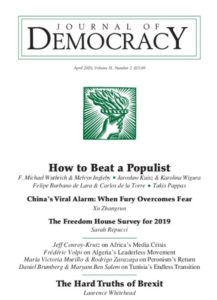 ”Professor Xu Zhangrun —now under house arrest (and featured in the latest Journal of Democracy) —has called on his compatriots to stop their uncritical support for the Chinese Communist Party (CCP), and instead to “rage against this injustice; let your lives burn with a flame of decency; break through the stultifying darkness and welcome the dawn,” add the open letter signatories (below, including many partners of the National Endowment for Democracy – NED).
”Professor Xu Zhangrun —now under house arrest (and featured in the latest Journal of Democracy) —has called on his compatriots to stop their uncritical support for the Chinese Communist Party (CCP), and instead to “rage against this injustice; let your lives burn with a flame of decency; break through the stultifying darkness and welcome the dawn,” add the open letter signatories (below, including many partners of the National Endowment for Democracy – NED).
- Judith Abitan, Executive Director of the Raoul Wallenberg Centre for Human Rights
- Mantas Adomėnas MP, Parliament of Lithuania
- Yoko Alender MP, Parliament of Estonia
- Lord Alton of Liverpool, House of Lords, United Kingdom
- Lord Andrew Adonis, House of Lords, United Kingdom
- Dibyesh Anand, University of Westminster
- Matteo Angioli, Global Committee for the Rule of Law “Marco Pannella”
- Nathan Attrill, Australian National University
- Rt Hon Norman Baker, Former Home Affairs minister, UK government
- Geremie R. Barmé, Historian, Professor Emeritus, The Australian National University
- Bastiaan Belder, Historian, Rapporteur European Parliament on EU-China relations 2004-2019
- Stephen Blank, Senior Fellow, FPRI.org
- Anne-Marie Brady, Global Fellow, Kissinger Institute on China and the US, Wilson Center, USA; Professor in Political Science and International Relations, University Canterbury, NZ
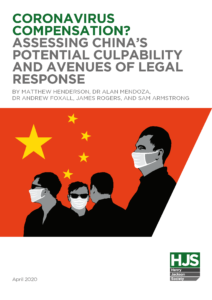 Charles Burton, Macdonald-Laurier Institute and European Values Center for Security Policy
Charles Burton, Macdonald-Laurier Institute and European Values Center for Security Policy- Jean-Pierre Cabestan, Professor, Hong Kong Baptist University
- William A. Callahan, Professor of International Relations, London School of Economics
- Kevin Carrico, Monash University
- Duanjie Chen, Macdonald-Laurier Institute
- Jerome A. Cohen, Founding Director, US-Asia Law Institute, New York University
- J Michael Cole, University of Nottingham and Senior fellow, Macdonald-Laurier Institute, Ottawa, Canada
- Damian Collins MP, House of Commons, United Kingdom
- Stephane Corcuffe, University of Lyon
- Irwin Cotler, Chair of the Raoul Centre for Human Rights, Emeritus Professor of Law at McGill University, and former Minister of Justice and Attorney General of Canada
- Halyna Coynash, Kharkiv Human Rights Group
- Hon Michael Danby MP, Seven term MP, former Parliamentary Secretary & past Chao Australian Parliament Foreign Affairs & Defence Committee
- Michael Danielsen, Taiwan Corner
- David A. Dayton, Utah Valley University
- Axel Dessein, King’s College London
- Horst Fabian, Independent researcher and Europe – China civil society ambassador
- Willy Fautré, Human Rights Without Frontiers
- Antonia Finnane, University of Melbourne
- Isaac Stone Fish, Senior Fellow, Asia Society
- Anna Fotyga, European Parliament
- Andrew Foxall, Henry Jackson Society
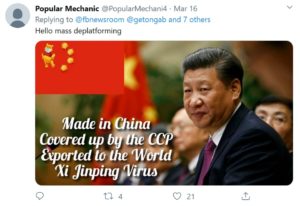
Wikipedia
- Vanessa Frangville, Université Libre de Bruxelles
- Aaron L. Friedberg, Princeton University
- Andreas Fulda, University of Nottingham, School of Politics and International Relations
- Daniel Garrett, Securing Tianxia
- Angela Gui, University of Cambridge
- Martin Hála, Sinopsis and Charles University
- Clive Hamilton, Charles Sturt University, Canberra
- Dan Harris, Harris Bricken
- Laura Harth, Global Committee for the Rule of Law “Marco Pannella”
- John Hemmings, Henry Jackson Society
- Frank Herschel Finch III, University of New Haven
- Michael Hsiao, Academia Sinica
- Massimo Introvigne, Sociologist, editor in chief of Bitter Winter
- Dolkun Isa, World Uyghur Congress
- Jakub Janda, Director, European Values Center for Security Policy, Prague, Czech Republic
- Filip Jirouš, Sinopsis
- Rasa Juknevičienė, European Parliament
- Thierry Kellner, Université libre de Bruxelles
- Tinatin Khidasheli, Civic IDEA, Former Minister of Defence, Georgia
- Tamar Kintsurashvili, Media Development Foundation
- Ondřej Klimeš, Researcher, Czech Academy of Sciences
- Marcus Kolga, Macdonald-Laurier Institute
- Marko Kovic, Independent researcher and writer in Zurich, Switzerland
- Andrius Kubilius, European Parliament
- Gabrielius Landsbergis, Chairman of the Homeland Union-Lithuanian Christian Democrats
- Gregory Lee, University of Lyon
- Anastasia Lin, Macdonald-Laurier Institute
- Petra Lindberg, SHRIC -Supporting Human Rights In China
- Jan Lipavský MP, House of Commons, Czech Republic
- Dimon Liu, Independent human rights activist
- Olga Lomová, Charles University
- Edward Lucas, Author, journalist, and senior vice-president, Center for European Policy Analysis
- Nicola Macbean, The Rights Practice
- Rahima Mahmut, Uyghur Human Rights Activist, U.K. Project Director, World Uyghur Congress
- Paul Maidowski, Fletcher School alumn
- Jonathan Manthorpe, International Affairs Commentator and author of “Claws of the Panda: Beijing’s Campaign of Influence and Intimidation in Canada” and “Forbidden Nation: A History of Taiwan.”
- Stewart McDonald MP, House of Commons, United Kingdom
- John Minford, Emeritus Professor of Chinese Studies, Australian National University
- David Missal, Sinologist and Freelance Journalist
- Juraj Mesík, Slovak Foreign Policy Association
- Giorgi Moldini, Stratcom Georgia
- Enrique Miguel Sanchez Motos, Senior Civil Servant. President of Association for the Defense of Freedom of Conscience
- John MacKenzie Nicolson, House of Commons, United Kingdom
- Manyan Ng, International Society for Human Rights
- Valérie Niquet, China and Asia specialist
- Mareike Ohlberg, Analyst, Mercator Institute for China Studies
- Kyle Olbert, Citizens of the American Republic
- Jojje Olsson, Swedish journalist
- Shaun O’Dwyer, Faculty of Languages and Cultures, Kyushu University
- Katarzyna Pejda, The John Paul II Catholic University of Lublin, Poland
- Andrew J Phelan, Med Tech Entrepreneur
- Johnathan Pollock, Editor, 9DashLine
- Patrick Poon, PhD researcher, Université Jean Moulin (Lyon III)
- Katerina Prochazkova, Sinopsis
- Luke de Pulford, Coalition for Genocide Response
- Jafer Qureshi, Consultant Psychiatrist – Fellow Of the Royal College of Psychiatry. Philanthropist
- Aaron Rhodes, President, Forum for Religious Freedom Europe
- Pablo Rodríguez-Merino, University of Warwick
- Benedict Rogers, Deputy Chair of Conservative Party Human Rights Commission & Chair of Hong Kong Watch
- Bert-Jan Ruissen, Member of the European Parliament
- Giulio Terzi di Sant’Agata, President of the “Global Committee for the Rule of Law- Marco Pannella”
- Łukasz Sarek, Researcher, Asia Explained
- Katarzyna Sarek, Jagiellonian University, Poland
- Puma Shen, National Taipei University
- Radosław Sikorski, European Parliament
- Duncan Stirling, Former participant; EU-China Managers Exchange and Training Programme. Former foreign expert; China Central Television
- Mark Stokes, The Project 2049 Institute
- May-Britt U. Stumbaum, Freie Universität Berlin
- Didi Kirsten Tatlow, Sinopsis
- Thierry Valle, President, Coordination des Associations et des Particuliers pour la Liberté de Conscience
- Jeffrey Wasserstrom, University of California, Irvine
- Michael B. Yahuda, Professor Emeritus, London School of Economics; Visiting Scholar, George Washington University
- Jianli Yang, Founder and President of Citizen Power Initiatives for China







